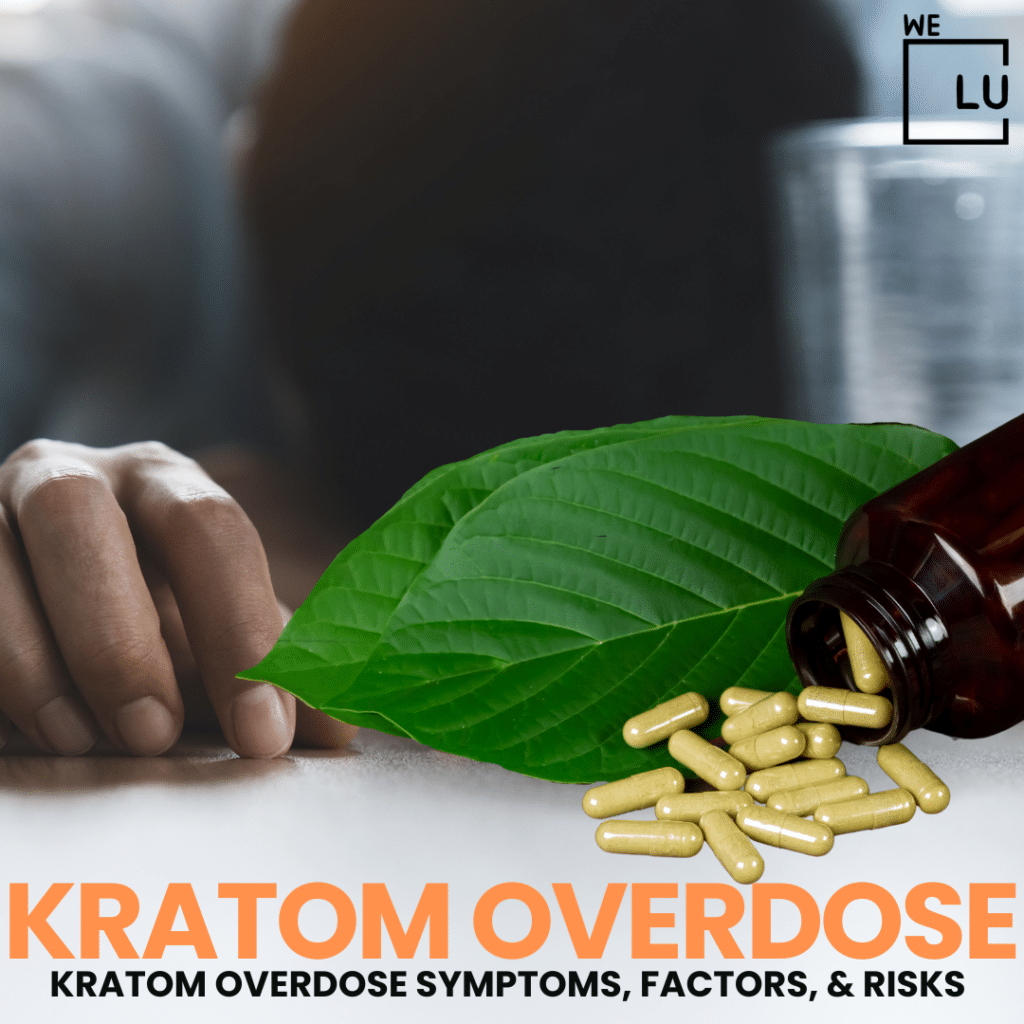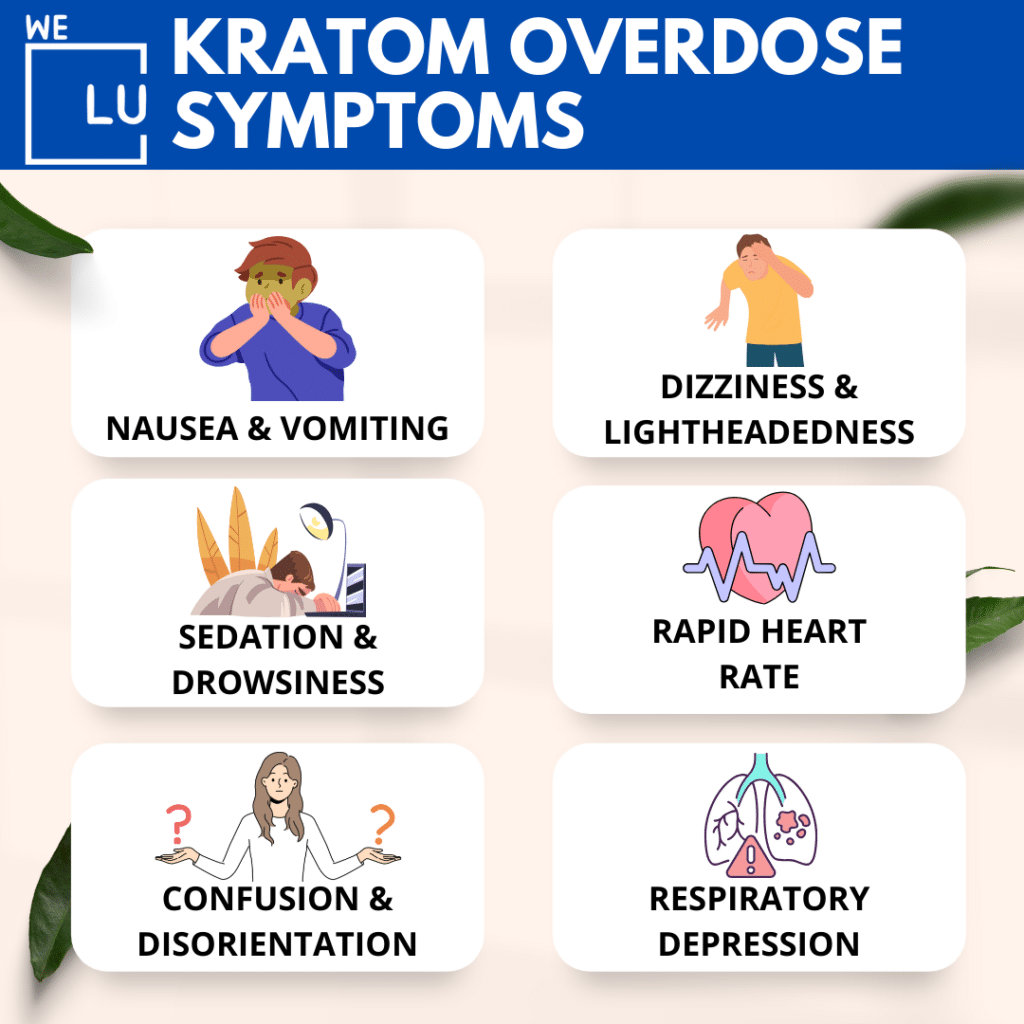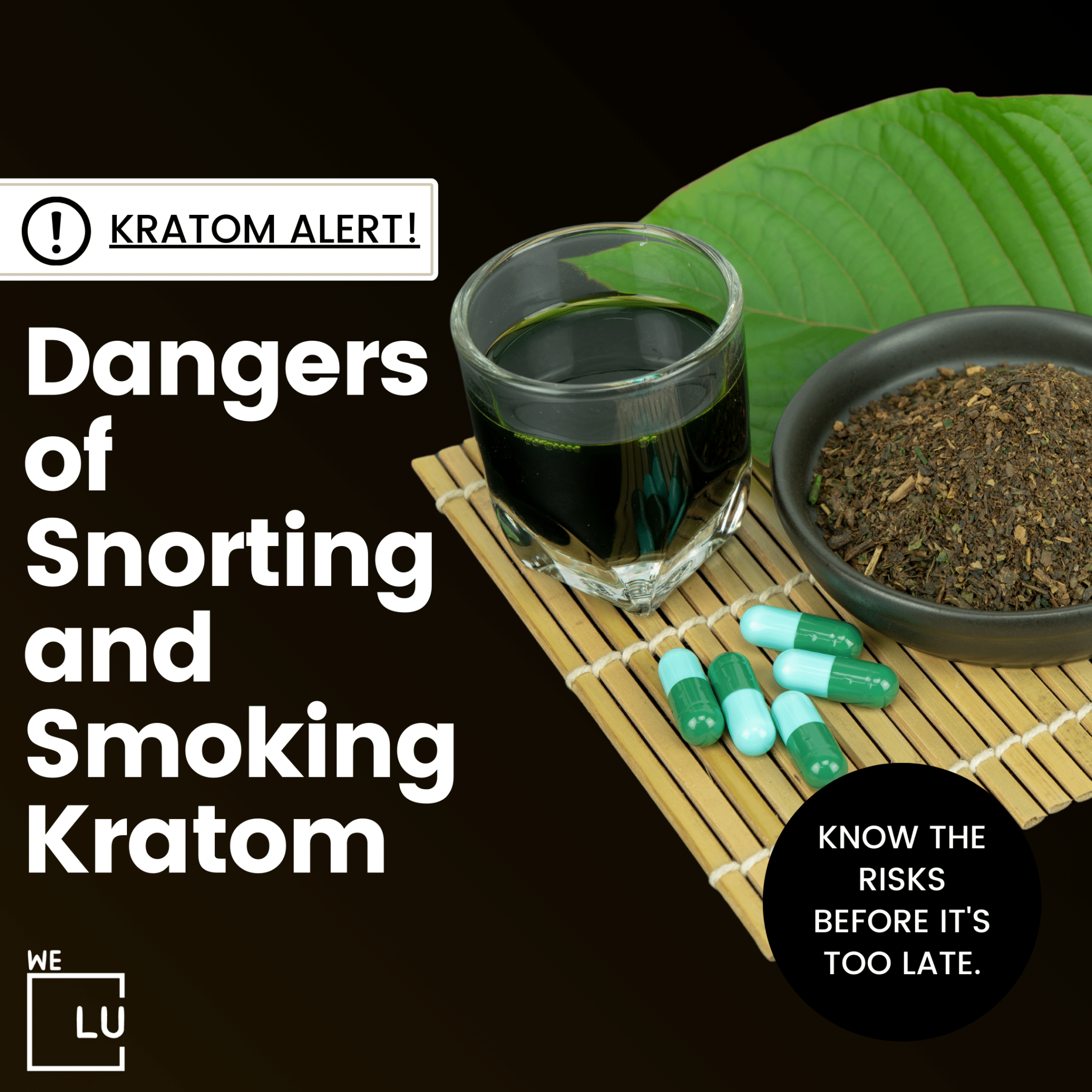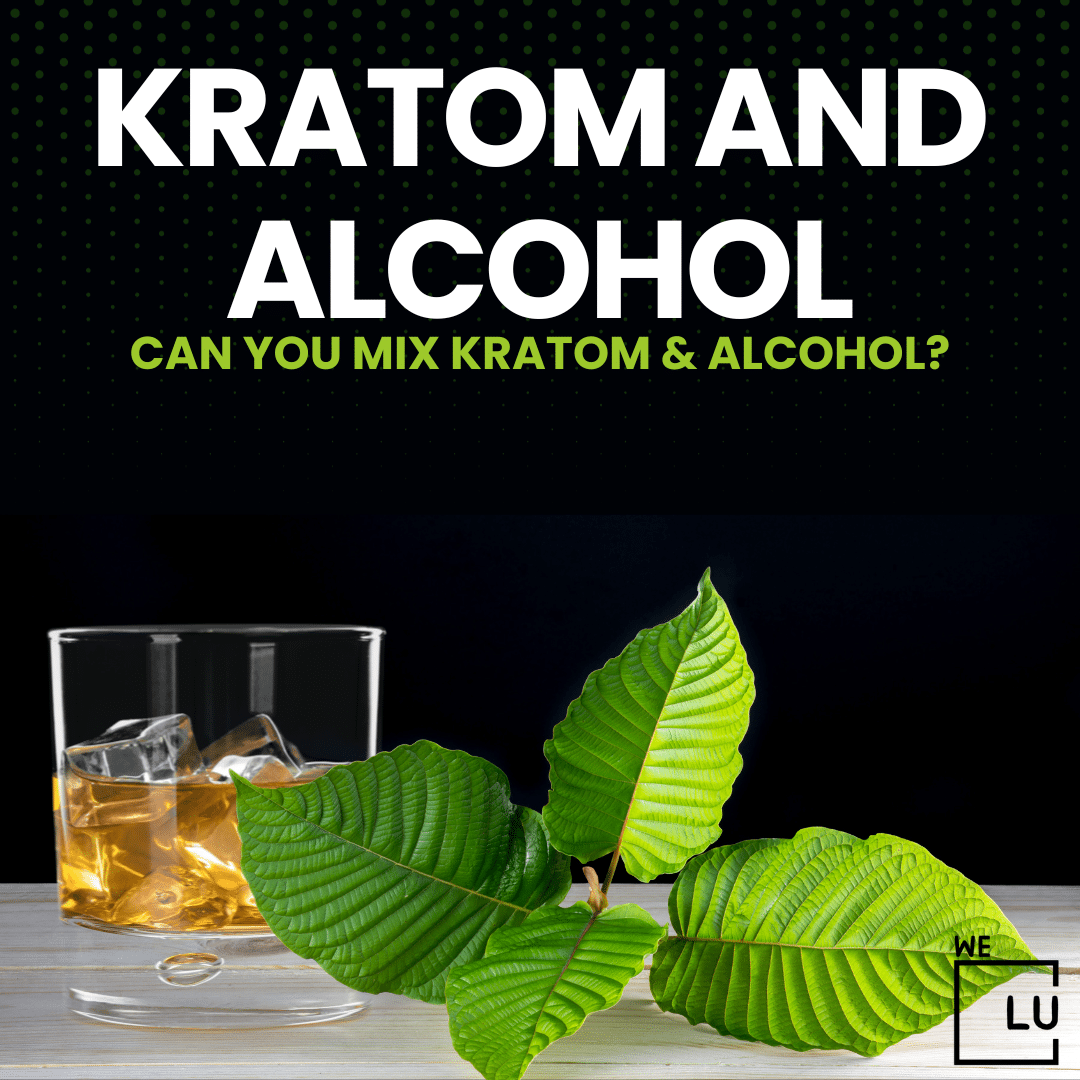Kratom, a tropical plant native to Southeast Asia, has gained popularity for its purported therapeutic effects, ranging from pain relief to mood enhancement. However, the misuse and abuse of kratom can lead to adverse consequences, including the potential for overdose. While kratom overdose is relatively rare, it is essential to be aware of the associated risks, especially given the lack of standardized production and limited scientific understanding of its long-term effects. Overdose symptoms may include nausea, vomiting, respiratory depression, and, in severe cases, seizures.
If you or someone you know is struggling with kratom addiction or experiencing adverse effects, it is crucial to seek professional help. Contact We Level Up CA for guidance and support on addressing kratom addiction and finding a path towards recovery. Your well-being is our priority.
What Is Kratom?
Kratom, scientifically known as Mitragyna speciosa, is a tropical evergreen tree native to Southeast Asia, particularly in Thailand, Malaysia, Indonesia, and Papua New Guinea. The leaves of the kratom tree have been traditionally used for centuries in the region for their stimulant and analgesic (pain-relieving) properties.
Kratom contains alkaloids, with mitragynine and 7-hydroxy mitragynine being the primary active compounds responsible for its effects. These alkaloids interact with opioid receptors in the brain, producing effects that vary depending on the dosage. At lower doses, kratom is often reported to have stimulant-like effects, including increased alertness and sociability. At higher doses, it may have sedative and analgesic effects.
Kratom has gained popularity in various parts of the world, including the United States and Europe, where it is sometimes marketed as an herbal supplement or alternative medicine. People have used it for various purposes, such as managing chronic pain, alleviating opioid withdrawal symptoms, and promoting relaxation.
However, kratom is a substance of concern, and its safety and potential for dependence and addiction are subjects of ongoing research and debate. The U.S. Food and Drug Administration (FDA) has raised concerns about the safety of kratom and its potential for abuse. Some countries and states have regulated or banned its use due to these concerns.
Can You Overdose On Kratom?
It is possible to overdose on kratom, although the likelihood appears to be relatively low compared to some other substances.
The risk of overdose is influenced by various factors, including the purity and potency of the kratom product, an individual’s tolerance, the presence of other substances, and the dosage consumed. Kratom has both stimulant and soothing properties, and the effects can vary depending on the amount ingested.
There have been reports of adverse events and deaths associated with kratom use. However, these cases often involve the co-use of other substances or underlying health conditions. The lack of regulation and standardized production of kratom products can also contribute to variations in potency and safety.
Kratom Overdose Symptoms
Kratom overdose symptoms can vary depending on the dosage, individual tolerance, and other factors. It’s important to note that while rare, kratom overdose can have serious consequences, including respiratory depression, seizures, and, in extreme cases, death. If you suspect a kratom overdose or experience severe adverse effects, seek medical attention immediately. The following are potential symptoms associated with a kratom overdose:
- Nausea and Vomiting: Taking a high dose of kratom can lead to nausea and vomiting, which are common side effects. Persistent and severe vomiting can contribute to dehydration and other complications.
- Sedation and Drowsiness: At higher doses, kratom tends to have sedative effects, causing drowsiness and a feeling of lethargy. Excessive sedation can lead to impaired coordination and a heightened risk of accidents.
- Confusion and Disorientation: Some individuals may experience confusion or disorientation as a result of a high kratom dose.
- Dizziness and Lightheadedness: Kratom can cause dizziness, especially at higher doses. This can be problematic, particularly if it leads to falls or accidents.
- Rapid Heart Rate: Kratom can have stimulant-like effects, and at high doses, it may cause an increase in heart rate.
- Respiratory Depression: In severe cases, kratom overdose can lead to respiratory depression, where breathing becomes slow and shallow. Respiratory depression is a serious medical emergency that requires immediate attention.
- Seizures: There have been reports of seizures associated with kratom use, particularly at higher doses.
- Tremors and Jitters: Excessive kratom consumption may lead to tremors or jitteriness.
Given the potential risks associated with kratom, it is advisable to approach its use with caution, be aware of proper dosing guidelines, and avoid combining it with other substances. If you have concerns about kratom use or experience any adverse effects, seek medical advice promptly.

Skip To:
Learn More:
- Kratom Side Effects Long-Term And Short-Term Side Effects.
- How Long Does Kratom Last In Your System? Kratom Half Life.
- Is Kratom An Opioid? Can You Use Kratom For Opioid Withdrawal?
- Risks And Effects Of Kratom Addiction. Is Kratom Addictive?
- Kratom Withdrawal Symptoms, Timeline, Dangers, And Detox
- What is the Most Addictive Drug? Top 10 Most Addictive Drugs, Cocaine, Heroin, Alcohol & More
- What does withdrawal mean? Symptoms, Causes, Types, Treatment & Medications
Treatment For Kratom Overdose
If you suspect a kratom overdose or experience severe adverse effects, seeking prompt medical attention is crucial. Treatment for a kratom overdose will generally focus on managing symptoms and providing supportive care. Here are some general approaches to treatment:
- Medical Evaluation: A healthcare professional will assess the individual’s overall health, vital signs, and symptoms. Laboratory tests may be conducted to assess organ function and rule out the presence of other substances.
- Supportive Care: Treatment may involve supportive measures to address specific symptoms. For example, intravenous fluids may be administered to address dehydration due to vomiting, and medications may be used to control nausea or seizures.
- Monitoring: Continuous monitoring of vital signs, including heart and respiratory rates, is essential, especially if there are concerns about respiratory depression. Patients may require close observation in an intensive care unit in severe cases.
- Respiratory Support: If respiratory depression is a concern, healthcare providers may provide oxygen therapy or, in extreme cases, assisted ventilation to ensure an adequate supply of oxygen.
- Activated Charcoal: In some cases, activated charcoal may be administered to help reduce the absorption of kratom in the gastrointestinal tract. This is often done if the ingestion occurs recently.
- Naloxone Administration: Naloxone is an opioid receptor antagonist that can reverse the effects of opioid toxicity, including respiratory depression. While kratom does not act directly on opioid receptors like traditional opioids, some cases have reported success with naloxone administration. However, the use of naloxone in kratom overdose is still a subject of debate, and its effectiveness may vary.
There is currently no specific antidote for kratom overdose, and treatment is generally supportive. Individuals who have ingested a large amount of kratom or are experiencing severe symptoms should not attempt self-treatment but should seek immediate medical attention.
As the understanding of kratom’s effects and risks continues to evolve, healthcare professionals will likely refine their approaches to managing kratom-related emergencies. If you or someone you know is experiencing symptoms of a kratom overdose, do not hesitate to call emergency services for immediate assistance.

Get Your Life Back
Find Hope & Recovery. Get Safe Comfortable Detox, Addiction Rehab & Dual Diagnosis High-Quality Care.
Hotline (855) 695-1160Kratom Overdose Risk Factors
Various factors can influence the risk of a kratom overdose, and individuals using or considering kratom need to be aware of these potential risk factors. Keep in mind that while kratom overdose is relatively uncommon, it can occur, and the severity of adverse effects may vary. Some of the risk factors associated with kratom overdose include:

- Dosage: The amount of kratom consumed is a significant factor. Taking high doses of kratom increases the risk of adverse effects and overdose. Dosage guidelines can vary among individuals, and what may be a safe dose for one person could be excessive for another.
- Potency and Purity of Kratom: The quality of kratom products can vary widely. Products with higher concentrations of active compounds, such as mitragynine and 7-hydroxy mitragynine, pose a greater risk of overdose. Contaminants or pollutants in kratom products can also contribute to adverse effects.
- Individual Tolerance: Individual tolerance to kratom can vary. Regular users may develop tolerance over time, requiring higher doses to achieve the desired effects. This can increase the risk of accidentally consuming excessive amounts.
- Combining with Other Substances: The simultaneous use of kratom with other substances, especially central nervous system depressants such as alcohol or benzodiazepines, can increase the risk of respiratory depression and other adverse effects.
- Medical Conditions: Pre-existing medical conditions, especially those affecting the liver or kidneys, may impact the metabolism and elimination of kratom from the body, potentially increasing the risk of toxicity.
- Drug Interactions: Kratom may interact with other medications, leading to unexpected effects or altered metabolism.
- Inexperienced Users: Individuals who are new to kratom may be less familiar with its effects and proper dosing, increasing the risk of accidental overdose.
- Underlying Health Issues: Individuals with certain health conditions, such as cardiovascular or respiratory problems, may be more susceptible to the adverse effects of kratom.
Individuals using or considering kratom should exercise caution, be informed about proper dosing guidelines, and be aware of potential risk factors. If you have any underlying health conditions or are taking medications, it’s advisable to consult with a healthcare professional before using kratom.
Furthermore, the legal status of kratom varies by location, and regulatory measures may impact its purity and safety. Staying informed about the latest research and guidelines is crucial for those who choose to use kratom. If you suspect a kratom overdose or experience severe adverse effects, seek immediate medical attention.
Get Help. Get Better. Get Your Life Back.
Searching for an Accredited Drug and Alcohol Rehab Centers in Near You?
Even if you have failed previously and relapsed, or are in the middle of a difficult crisis, we stand ready to support you. Our trusted behavioral health specialists will not give up on you. When you feel ready or just want someone to speak to about therapy alternatives to change your life call us. Even if we cannot assist you, we will lead you to wherever you can get support. There is no obligation. Call our hotline today.
FREE Addiction Hotline – Call 24/7Is There A Kratom Lethal Dose?
The determination of a lethal dose for kratom is challenging because the available scientific research is limited, and the effects of kratom can vary widely among individuals. Additionally, factors such as the purity and potency of the kratom product, an individual’s tolerance, and the presence of other substances can influence the potential for harm.
While there have been reports of deaths associated with kratom use, it’s important to note that many of these cases involved the co-ingestion of other substances, including pharmaceutical drugs and illicit substances. The specific role of kratom in these cases is often unclear, and the cause of death may be multifactorial.

First-class Facilities & Amenities
World-class High-Quality Addiction & Mental Health Rehabilitation Treatment
Rehab Centers TourRenowned California Addiction Center. Serene Private Facilities. Inpatient rehab programs vary.
Addiction Helpline (855) 695-1160Proven recovery success experience, backed by a Team w/ History of:
15+
Years of Unified Experience
100s
5-Star Reviews Across Our Centers
10K
Recovery Success Stories Across Our Network
- Low Patient to Therapist Ratio
- Onsite Medical Detox Center
- Comprehensive Dual-Diagnosis Treatment
- Complimentary Family & Alumni Programs
- Coaching, Recovery & Personal Development Events
Kratom Dosages
Determining appropriate kratom dosages can be challenging, as individual responses to kratom can vary widely. Several factors, including tolerance, body weight, metabolism, and the specific strain of kratom, can influence the effects and optimal dosage. The U.S. Food and Drug Administration (FDA) has not established recommended dosage guidelines for kratom.

Here are some general guidelines based on user reports, but keep in mind that individual experiences may differ:
- Low Dosage (1-2 grams): At lower doses, kratom is often reported to have stimulating effects. Users may experience increased alertness, energy, and sociability.
- Moderate Dosage (2-4 grams): This range is often associated with a balance between stimulating and sedative effects. Users may experience mild euphoria, pain relief, and improved mood.
- High Dosage (4-8 grams): Higher doses of kratom can lead to more pronounced sedative effects. Users may experience deep relaxation, pain relief, and a sense of calmness.
- Very High Dosage (8 grams and above): Doses in this range are more likely to produce sedative effects and may increase the risk of adverse reactions. Higher doses should be approached with caution due to the potential for nausea, dizziness, and other side effects.
Factors to consider when determining dosage
- Strain Differences: Different strains of kratom (e.g., Bali, Maeng Da, Thai) may have varying potencies and effects. Be aware of the specific characteristics of the strain you are using.
- Individual Sensitivity: People react differently to kratom, and personal tolerance levels can vary. Factors such as overall health, body weight, and metabolism can influence sensitivity.
- Purpose of Use: The reason for using kratom (e.g., pain relief, mood enhancement, energy boost) can also impact the optimal dosage.
- Quality of Kratom: The quality and purity of the kratom product can vary. It’s advisable to purchase kratom from reputable sources to ensure product safety.
World-class, Accredited, 5-Star Reviewed, Effective Addiction & Mental Health Programs. Complete Behavioral Health Inpatient Rehab, Detox plus Co-occuring Disorders Therapy.
CALL (855) 695-1160End the Addiction Pain. End the Emotional Rollercoaster. Get Your Life Back. Start Drug, Alcohol & Dual Diagnosis Mental Health Treatment Now. Get Free No-obligation Guidance by Substance Abuse Specialists Who Understand Addiction & Mental Health Recovery & Know How to Help.
“One step at a time. You’ll get there.” Inspirational addiction Recovery Quotes & Sobriety Quotes.
Experience Transformative Recovery at the We Level Up California Treatment Center.
See our authentic success stories. Get inspired. Get the help you deserve.



Start a New Life
Begin with a free call to an addiction & behavioral health treatment advisor. Learn more about our dual-diagnosis programs. The We Level Up treatment center network delivers recovery programs that vary by each treatment facility. Call to learn more.
- Personalized Care
- Caring Accountable Staff
- World-class Amenities
- Licensed & Accredited
- Renowned w/ 100s 5-Star Reviews
We’ll Call You
Search We Level Up CA Kratom Overdose Drug & Alcohol Rehab / Detox & Mental Health Topics & Resources
Sources
- Palasamudram Shekar S, Rojas EE, D’Angelo CC, Gillenwater SR, Martinez Galvis NP. Legally Lethal Kratom: A Herbal Supplement with Overdose Potential. J Psychoactive Drugs. 2019 Jan-Mar;51(1):28-30. doi: 10.1080/02791072.2018.1562591. Epub 2019 Jan 8. PMID: 30620247. https://pubmed.ncbi.nlm.nih.gov/30620247/
- NIDA. “Kratom.” National Institute on Drug Abuse, 25 Mar. 2022, https://nida.nih.gov/research-topics/kratom
- DEA – Kratom Drug Fact Sheet – https://www.dea.gov/sites/default/files/2020-06/Kratom-2020_0.pdf
- FDA – Kratom – https://www.fda.gov/news-events/public-health-focus/fda-and-kratom
- Henningfield JE, Chawarski MC, Garcia-Romeu A, Grundmann O, Harun N, Hassan Z, McCurdy CR, McMahon LR, Sharma A, Shoaib M, Singh D, Smith KE, Swogger MT, Vicknasingam B, Walsh Z, Wang DW, Huestis MA. Kratom withdrawal: Discussions and conclusions of a scientific expert forum. Drug Alcohol Depend Rep. 2023 Mar 15;7:100142. doi: 10.1016/j.dadr.2023.100142. PMID: 37397437; PMCID: PMC10311168. https://www.ncbi.nlm.nih.gov/pmc/articles/PMC10311168/ Read More: kratom detox, detoxing from kratom, kratom for opiate detox, how to detox from kratom, detox from kratom, how long does it take to detox from kratom,
- Striley CW, Hoeflich CC, Viegas AT, Berkowitz LA, Matthews EG, Akin LP, Iheanyi-Okeahialam C, Mansoor U, McCurdy CR. Health Effects Associated With Kratom (Mitragyna speciosa) and Polysubstance Use: A Narrative Review. Subst Abuse. 2022 May 20;16:11782218221095873. doi: 10.1177/11782218221095873. PMID: 35645563; PMCID: PMC9130800. https://www.ncbi.nlm.nih.gov/pmc/articles/PMC9130800/
- Jentsch MJ, Pippin MM. Kratom. [Updated 2023 Aug 28]. In: StatPearls [Internet]. Treasure Island (FL): StatPearls Publishing; 2023 Jan-. Available from: https://www.ncbi.nlm.nih.gov/books/NBK585120/
- Eastlack SC, Cornett EM, Kaye AD. Kratom-Pharmacology, Clinical Implications, and Outlook: A Comprehensive Review. Pain Ther. 2020 Jun;9(1):55-69. doi: 10.1007/s40122-020-00151-x. Epub 2020 Jan 28. PMID: 31994019; PMCID: PMC7203303. https://pubmed.ncbi.nlm.nih.gov/31994019/
- Singh D, Narayanan S, Vicknasingam B, Corazza O, Santacroce R, Roman-Urrestarazu A. Changing trends in the use of kratom (Mitragyna speciosa) in Southeast Asia. Hum Psychopharmacol. 2017 May;32(3). doi: 10.1002/hup.2582. Epub 2017 May 24. PMID: 28544011. https://pubmed.ncbi.nlm.nih.gov/28544011/
- Grundmann O, Veltri CA, Morcos D, Knightes D 3rd, Smith KE, Singh D, Corazza O, Cinosi E, Martinotti G, Walsh Z, Swogger MT. Exploring the self-reported motivations of kratom (Mitragyna speciosa Korth.) use: a cross-sectional investigation. Am J Drug Alcohol Abuse. 2022 Jul 4;48(4):433-444. doi: 10.1080/00952990.2022.2041026. Epub 2022 Apr 7. PMID: 35389321.https://pubmed.ncbi.nlm.nih.gov/35389321/
- Papadi G, Bakhiya N, Ildico Hirsch-Ernst K. Assessment of the possible health risks associated with the consumption of botanical preparations of Mitragyna speciosa (kratom). EFSA J. 2022 May 25;20(Suppl 1):e200415. doi: 10.2903/j.efsa.2022.e200415. PMID: 35634550; PMCID: PMC9131591. https://pubmed.ncbi.nlm.nih.gov/35634550/
- Singh D, Müller CP, Vicknasingam BK, Mansor SM. Social Functioning of Kratom (Mitragyna speciosa) Users in Malaysia. J Psychoactive Drugs. 2015 Apr-Jun;47(2):125-31. doi: 10.1080/02791072.2015.1012610. PMID: 25950592. https://pubmed.ncbi.nlm.nih.gov/25950592/




